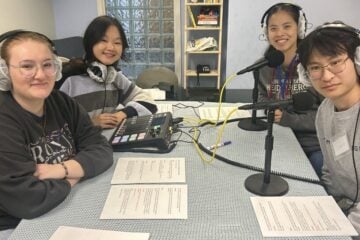Opinion: Why NPR’s dispute with CPB really is about the First Amendment

April Simpson / Current
Over the past couple of weeks, there have been a bunch of opinions about “NPR taking CPB to court” over interconnection funding. Some are ill-informed (“clinging to distribution”) or disingenuous (the First Amendment as a “pawn”). But many more network and station stakeholders are earnestly wondering what this is all about.
Here’s the bottom line: NPR is defending the First Amendment — for itself, and for every station that wants to make choices about what content it provides to listeners. This isn’t about a new company, distribution or grant money. Regardless of the outcome of the case, the Public Radio Satellite System will serve public radio stations with excellence for the foreseeable future, and that’s one less thing for station managers to worry about.
But the integrity of the First Amendment is very much an open question right now. If its protections are rendered hollow, and if after generations of outstanding work CPB is made to capitulate to an executive order, how valuable will public media’s continued service to our communities actually be?
I urge you to find the time to read NPR’s filings. On April 2, CPB informed NPR it would be extending its interconnection grant with NPR for its management and operation of PRSS. Then, as political pressure grew, CPB reversed course. On April 11 — just days before President Trump made public his desire to rescind CPB funding — CPB told NPR that it would not give PRSS funds to NPR and that it instead would give those funds to another, unidentified entity.
May 1 brought the president’s executive order related to federal funding for NPR and PBS; NPR, stations and, later, PBS sued to block implementation. CPB leadership itself readily and correctly called the EO unconstitutional, yet it proceeded with an RFP for a new entity to provide interconnection services.
Although CPB made clear in April that it would not grant any interconnection funding to NPR, NPR submitted a response to the RFP proposing similar PRSS support that CPB had previously approved in the spring. CPB did not engage with NPR’s proposal or ask any questions of NPR. Last month, CPB awarded a more-than–$50 million grant to a new organization that as of this moment exists only on paper.
Here’s the short version: As anti–public broadcasting political rhetoric grew during April, CPB appears to have decided it wanted to survive defunding at any cost and that its decades-long relationship with NPR created a risk to the organization. So it abruptly reversed its decision to fund NPR for PRSS after 40 years of service. That is what historian Timothy Snyder calls “obeying in advance.”
In hindsight, maybe NPR made a mistake by not being more vocal during this process. That approach came from laudable goals: not to introduce more uncertainty into an already uncertain time and to avoid the public appearance of infighting in public media.
But NPR has done a lot right, too. CEO Katherine Maher’s weekly calls with the entire network beginning this summer represent an unprecedented level of communication and partnership between NPR’s leader and the network as a whole. And I am exceptionally proud of NPR’s willingness to fight for the First Amendment.
So long as the EO stands unchallenged, any federal agency can set conditions on how stations spend federal funding, inhibiting their ability to make free choices about programming or services. This is a direct threat to freedom of the press and every station’s First Amendment protections of freedom of speech and association.
NPR, stations and PBS are fighting for those protections, and NPR’s filing against CPB is another critical step in that fight. CPB’s decision to take away PRSS funding — ironically, CPB’s own “rescission” — demonstrates the EO is effective in getting entities to comply with restricting First Amendment rights. It would be a tragedy for the country if the EO stands.
There’s a great deal of understandable anxiety and fear in public media right now. We all feel it to different degrees, and we can’t minimize the fact that good people are losing jobs and heritage enterprises are closing down or are on the brink of it. Funding is top of mind for all of us, but it’s critical to note that any funds awarded to NPR for interconnection can be used only to support PRSS — they cannot be used by NPR for anything else. Period. NPR’s strategy is focused on improving the entire public radio system, and it’s not dependent on PRSS grant funds.
CPB has the power to resolve this now, helping overturn this unlawful order and releasing all funds to the system in the process. It can acknowledge its decision to withhold interconnection funding was made in whole or in part due to the EO and under pressure from the administration. This would make it clear to the court that the EO has been effective in achieving its goal of viewpoint discrimination.
CPB can strike a final, fatal blow to this unconstitutional order as a valiant last act to protect and preserve editorial independence for public media, safeguarding our news, documentaries and cultural and educational programming from government interference. In doing so, they will stand on the side of the First Amendment — that powerful right from which all of our other democratic rights originate. I ultimately predict that right is what will prevail. It has to. The public media mission — and so much more — depends on it.
R.C. McBride is a 30-year media veteran who has worked as an award-winning journalist, sportscaster, PD, multimedia strategist and, currently, executive director. His teams have won eight Regional and three National Edward R. Murrow Overall Excellence Awards and two Marconi Awards for National Radio Station of the Year, and they have picked up three Illinois Radio Station of the Year honors. He was elected as an NPR Board member director in 2022.






There’s no logical, business, or logistical reason for NPR, a content creator, to control or operate the public radio distribution system for all stations and all content creators. That would be akin to having ABC-TV network be the distributor of all network TV content (including the other networks) to commercial TV stations. CPB recognized this with its competitive process. The suit reflects old thinking, and sadly a hint of desperation. I hope NPR reflects on their action and stands down. With respect, public media doesn’t need a circular firing squad in this moment.
With all due respect Tim, your comment is misinformed. NPR does not own the PRSS, stations do. Those stations selected NPR as the manager and operator of the system more than 40 years ago and are happy with NPR as the operator. CPB has a statutory obligation to fund public radio distribution. I encourage you to read the lawsuit. CPB’s board voted to fund the PRSS for three years then reversed course. This about face was due to CPB bowing to pressure from the administration. CPB should admit it was wrong and return funding to the station-owned PRSS.
Some thoughts about this piece:
1. It likely represents the view of management and the board. From my time on the board at a time of strife, any communication like this was vetted and approved. A board member would not post an opinion piece about current litigation without the lawyers involved.
2. NPR claims that the decision to not grant them interconnection funding was related to the Trump Executive Order, which directed CPB to not provide funds to NPR or PBS. Yet, CPB provided interconnection funding to PBS, an organization which was similarly targeted by the EO. Worth pondering.
3. The filing identifies no grants awarded by CPB that were canceled after the Executive Order. It only cites the fact that CPB awarded the grant to another party through a competitive process. There doesn’t appear to be a smoking gun in this filing (but maybe more will come out).
4. NPR said in their recent Q&A that this action isn’t new — it’s just a continuation of an earlier suit brought against the EO by NPR, Aspen Public Radio, Colorado Public Radio and KSUT. The suit against CPB, though, does not include them as complainants. Were they asked and declined to participate?
NPR says this is about protecting the First Amendment. I don’t doubt that it’s a motivating factor. But ultimately, the remedy they seek is to overturn the competitive process and have the grant go to them.
A quote attributed to H.L. Mencken comes to mind. “If somebody says it’s not about the money, it’s about the money.”
Thanks Mike, but I think the point that this was decided 40 years ago actually supports my point. It is far from clear that a majority of stations support keeping it as is.
Disagree Tim. Stations value the PRSS and NPR management. Consistently high ratings for service and uptime. No other entity can do what the PRSS does in providing live content to stations. CPB was wrong in not fulfilling its statutory obligation to fund the PRSS. NPR is the national provider of choice by stations. And yes Steve I agree – follow the money. CPB provided funds to PRSS for more than 40 years and then provided the funds for the next three years, then pulled that funding and demanded NPR spin off PRSS in order to get the money. That money goes to the station-owned PRSS. NPR was and still selected as operator. I appreciate the birds eye perspective from folks in periphery but I’ve been involved with PRSS and NPR directly for nearly 9 years on distribution. CPB should admit it was influenced by the administration and return the money to the station-owned PRSS which it was statutorily obligated to do.